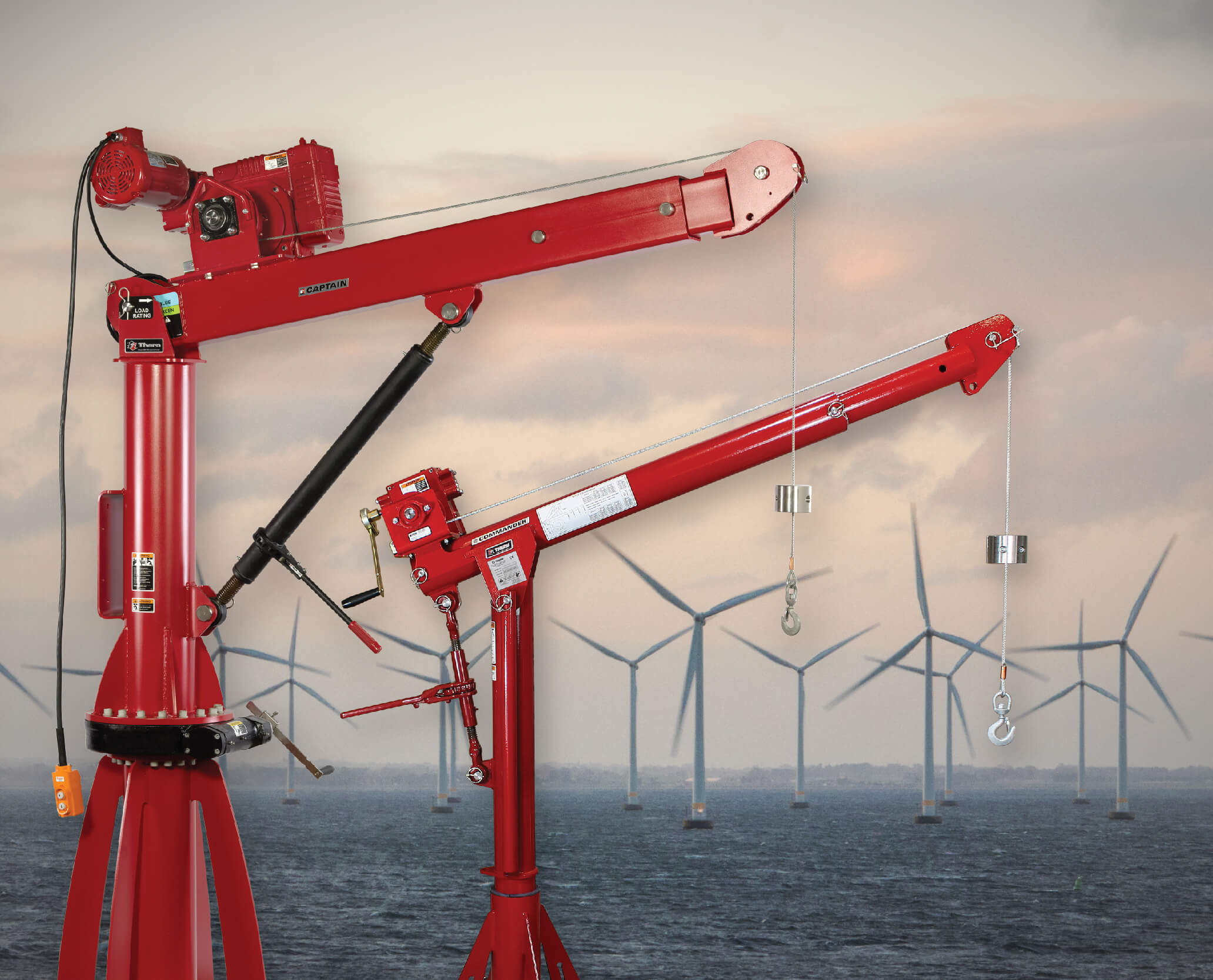The Role of Material Selection in Davit Crane Performance
Davit cranes are the perfect solution for lifting, lowering, and positioning tasks of all kinds. Both portable and stationary davits are used in all kinds of industries, including marine, manufacturing, construction, industrial, and defense. Different styles of davits are best suited for different applications, depending on the specific environments and the job that needs to be done.
One of the most important considerations when deciding on the right davit crane is the material: steel or aluminum. Both have their benefits in different applications, so choosing correctly is key to getting the best performance, durability, and value out of your crane.
Strength and Load Capacity
In general, if heavy-duty capacity is your main concern, you should at least be considering a steel davit crane. Since they are made from sturdier, stronger materials, steel cranes, like Then’s Captain series, are capable of lifting much heavier loads than aluminum cranes. Steel davits are a great choice for applications like warehouses where heavy loads need to be moved over and over again, as the strength and consistency of these cranes can stand up to the continual task of heavy lifting.
Weight and Portability
As it is a stronger material, it shouldn’t be a surprise that steel cranes are heavier than their aluminum counterparts. The combination of aluminum and expert engineering gives many aluminum crane models an edge in portability, allowing them to fulfill multiple functions on a jobsite. They are also easy to install since they don’t require the same kind of heavy-duty base that steel cranes do. Options like the Commander AL are built to be both easy to disassemble and assemble, and they are lightweight enough to maintain real, functional portability. These types of cranes are excellent for applications like remote jobsites and water utilities that can benefit from cranes that are flexible in their application and quickly adaptable to fit different needs.
Corrosion Resistance and Environmental Suitability
When considering aluminum versus steel davit cranes, keep in mind the environment your cranes will be working in. Aluminum is naturally resistant to corrosion, even when subjected to harsh conditions like salt spray. Steel, on the other hand, will corrode when exposed to these elements; even steels protected by coatings can be susceptible to rust as the coating wears away. For applications that are in harsh environments — like wastewater plants, dock lifting, manufacturing plants with chemical exposure, and oil rigs — aluminum cranes offer the better mix of maintenance-free corrosion resistance and reliable performance.
Durability and Maintenance Over Time
Steel and aluminum davit cranes can be highly durable, but steel cranes will generally require more maintenance. As mentioned above, steel corrodes much easier than aluminum, so performance and durability can be affected if proper maintenance and upkeep is not performed.
Both types of cranes are built to be durable, but it’s important to consider a number of safety factors that are unique to each. Steel cranes generally deflect and bend predictably, showing significant deflection before bending permanently. On the other hand, aluminum cranes are designed to show similar deflection to steel cranes under the same load, but actually deflect more than steel. Instead of permanently bending, some aluminum cranes will snap when they fail, making it essential to avoid severe overloading. On the whole, the design factors for steel and aluminum crane components are equivalent, but knowing the distinct ways different materials can fail will make it easier to spot issues during regular maintenance.
Customization and Design Flexibility
Generally, aluminum cranes are more modular and adjustable than steel cranes, with more interchangeable parts and features. High-quality steel davits can provide some flexibility, but they are more limited, simply based on their design. If your application is unique and requires a custom davit crane, the good news is you won’t have to pick between steel versus aluminum — both types of crane can be built to fit your needs. In fact, Thern offers industry-leading crane customization services with a team of engineering experts that can design and build the exact davit you’re looking for.
When to Choose Steel vs. When to Choose Aluminum
Picking the right davit crane is crucial to ensuring consistent success on any job. While your individual needs may be unique, there are a few general guidelines you should follow when deciding on your crane:
- Steel cranes are better suited for permanent installations, while aluminum cranes are more portable
- If you’re lifting really heavy loads, especially in sheltered environments, opt for steel
- For jobs in corrosive or harsh conditions, go with aluminum
- Aluminum portable cranes are the cost-effective choice for sites that require cranes for more than one application
The Right Davit Crane Starts with the Right Material
Before deciding on the crane you need, evaluate your job’s mobility needs, load requirements, site environment, and potential for harsh conditions. If you aren’t sure what type of crane is best for you, don’t hesitate to contact our experts. We’d be happy to help you choose the right davit and answer any questions that you may have.
